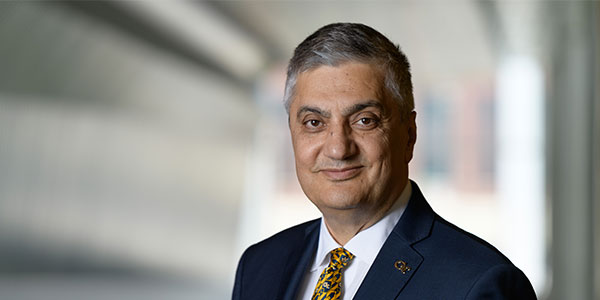Dr. Chaouki T. Abdallah Named LAU’s 10th President
Mr. Philip Stoltzfus, Chair of the Board of Trustees of the Lebanese American University (LAU), announced today that the Board has unanimously approved the appointment of Dr. Chaouki T. Abdallah as LAU’s 10th President.
A native of Lebanon, Dr. Abdallah currently serves as the Executive Vice President for Research at the Georgia Institute of Technology (Georgia Tech), which ranks 36th in the world according to Times Higher Education. In this role, Dr. Abdallah is responsible for a research budget exceeding $1.4 billion. His extensive administrative experience includes serving as President and Provost of the University of New Mexico prior to joining Georgia Tech. Dr. Abdallah is highly regarded in academia, with an H-index of 43, having published more than 360 peer-reviewed papers specializing in systems theory with a focus on control, communications, and computing systems. He serves on numerous academic, philanthropic, and industry boards, bringing to LAU an extensive international network.
Dr. Abdallah earned his PhD (1988) and MS degree (1982) from Georgia Tech, commencing his higher education at Université Saint Joseph (USJ) in Lebanon before completing his Bachelor of Engineering degree at Youngstown State University in 1981.
Dr. Abdallah serves on the Board of Trustees of the American University of Sharjah, Georgia Advanced Technology Ventures, the Georgia Tech Foundation, and Southern Light Rail, having previously held positions on several other academic, philanthropic, and industry boards.
Mr. Stoltzfus stated that “Dr. Abdallah embodies the qualities and values that the Board seeks in our next President, someone who evinces strategic vision, academic leadership, financial acumen, collaborative management, and the ability to engage with internal and external stakeholders while building organizational capacity. Above all, he manifests the qualities of our founders and subsequent presidents: mission-driven, inclusive, seeking to serve all the communities of Lebanon, possessing the highest ethical standards and utterly removed from partisan politics.”
He added that “Building on the legacy of President Mawad, who led the University through challenging times, the mission now requires LAU to become a global institution, with a New York campus, MENA regional initiatives, online education, and bold investment in research taking the University to new places and new opportunities in a way never imagined by our founders a century ago. LAU is confident that Dr. Abdallah is the right leader to steward this sacred mission.”
Dr. Abdallah expressed his excitement for the role, stating, “LAU is entering a crucial phase in its distinguished history. As we celebrate LAU’s centennial, opportunities abound to contribute even more to educating future generations of leaders and doers. Leveraging the immense potential of our dedicated students, faculty, staff, and alumni that is bolstered by unwavering support from the Board, will ensure our trajectory continues to shine.” He added, “I am eager to return to Lebanon and to ensure that LAU in close partnership with other higher education institutions, continue their positive influence on the well-being of our communities in Lebanon, the Arab world and globally.”
